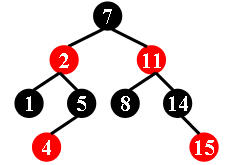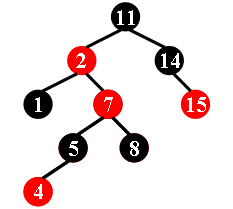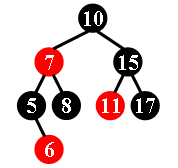There is a kind of balanced binary search tree named red-black tree in the data structure. It has the following 5 properties:
- (1) Every node is either red or black.
- (2) The root is black.
- (3) Every leaf (NULL) is black.
- (4) If a node is red, then both its children are black.
- (5) For each node, all simple paths from the node to descendant leaves contain the same number of black nodes.
For example, the tree in Figure 1 is a red-black tree, while the ones in Figure 2 and 3 are not.
 |
 |
 |
|---|---|---|
| Figure 1 | Figure 2 | Figure 3 |
For each given binary search tree, you are supposed to tell if it is a legal red-black tree.
Input Specification:
Each input file contains several test cases. The first line gives a positive integer K (≤30) which is the total number of cases. For each case, the first line gives a positive integer N (≤30), the total number of nodes in the binary tree. The second line gives the preorder traversal sequence of the tree. While all the keys in a tree are positive integers, we use negative signs to represent red nodes. All the numbers in a line are separated by a space. The sample input cases correspond to the trees shown in Figure 1, 2 and 3.
Output Specification:
For each test case, print in a line "Yes" if the given tree is a red-black tree, or "No" if not.
Sample Input:
3
9
7 -2 1 5 -4 -11 8 14 -15
9
11 -2 1 -7 5 -4 8 14 -15
8
10 -7 5 -6 8 15 -11 17
Sample Output:
Yes No No

#include<iostream> #include<algorithm> #include<cstdio> #include<queue> using namespace std; bool cmp(int a, int b){ return abs(a) < abs(b); } int K, N; typedef struct NODE{ struct NODE *lchild, *rchild; int data; }node; void insert(node* &root, int data){ if(root == NULL){ root = new node; root->lchild = NULL; root->rchild = NULL; root->data = data; return; } if(abs(data) < abs(root->data)) insert(root->lchild, data); else insert(root->rchild, data); } int cnt, isEqu; void preOrder(node* root, int dp){ if(root == NULL){ dp++; if(cnt == -1){ cnt = dp; }else{ if(cnt != dp) isEqu = 0; } return; } if(root->data > 0) dp++; preOrder(root->lchild, dp); preOrder(root->rchild, dp); } int exam(node* root){ if(root->data < 0) //负数为红 return 0; queue<node*> Q; Q.push(root); int tag = 1; while(Q.empty() == false){ node* temp = Q.front(); if(temp->data < 0){ if(temp->lchild != NULL && temp->lchild->data < 0 || temp->rchild != NULL && temp->rchild->data < 0){ tag = 0; break; } } Q.pop(); cnt = -1, isEqu = 1; preOrder(temp, 0); if(isEqu == 0){ tag = 0; break; } if(temp->lchild != NULL) Q.push(temp->lchild); if(temp->rchild != NULL) Q.push(temp->rchild); } return tag; } int main(){ scanf("%d", &K); for(int i = 0; i < K; i++){ scanf("%d", &N); node* root = NULL; for(int j = 0; j < N; j++){ int temp; scanf("%d", &temp); insert(root, temp); } if(root == NULL) printf("Yes\n"); else if(exam(root) == 1) printf("Yes\n"); else printf("No\n"); } cin >> N; return 0; }
总结:
1、题意:给出一个平衡二叉搜索树的前序序列,给出红黑树的定义,检验该平衡二叉搜索树是否是红黑树。
2、给出了平衡二叉搜索树的前序序列,就可以仅仅根据前序序列建立原树,再按部就班进行检验。检验可以分别针对红黑树的要求逐条检验,首先看根。然后按照层序的顺序,对每一个节点做如下检验:1)若它是红的,检验它的左右孩子。 2)用DFS,遍历从该节点开始到叶节点(空节点)的所有路径,统计每个路径分别的黑节点总数。
3、关于建立原树,有两种办法。一是,由于搜索树的中序是从小到大的有序序列,可以先将所有节点排序得到中序序列。再按照已知前序和中序的方法,建立二叉树。二是,由于有序二叉树的先序序列的意义:根在前子树在后,且小于根的节点在左,大于的在右。所以可以直接把先序序列当作有序二叉树的插入的顺序,按顺序插入节点,得到原树。注意已知序列是有序二叉树的先序,则可以把它当作插入顺序。但已知插入顺序,这个插入顺序却不一定是先序。
